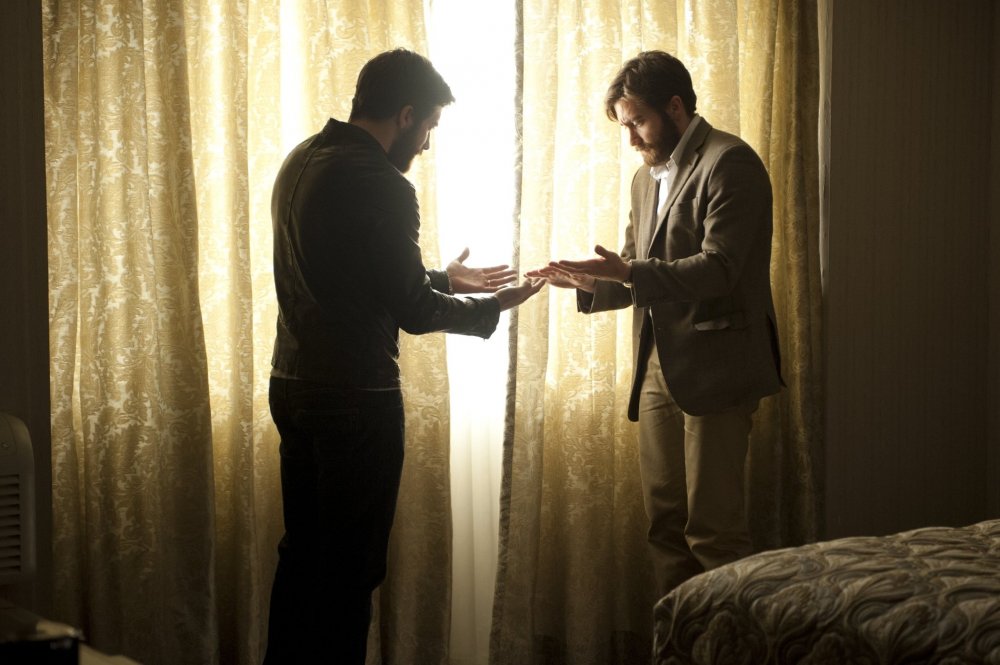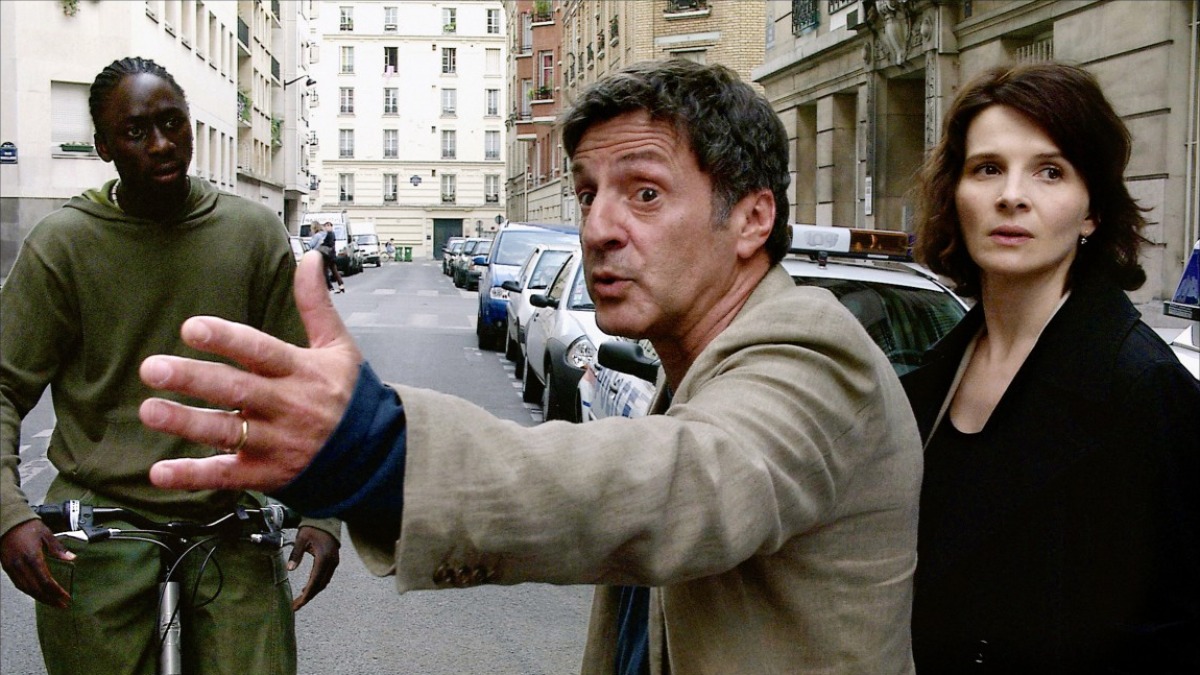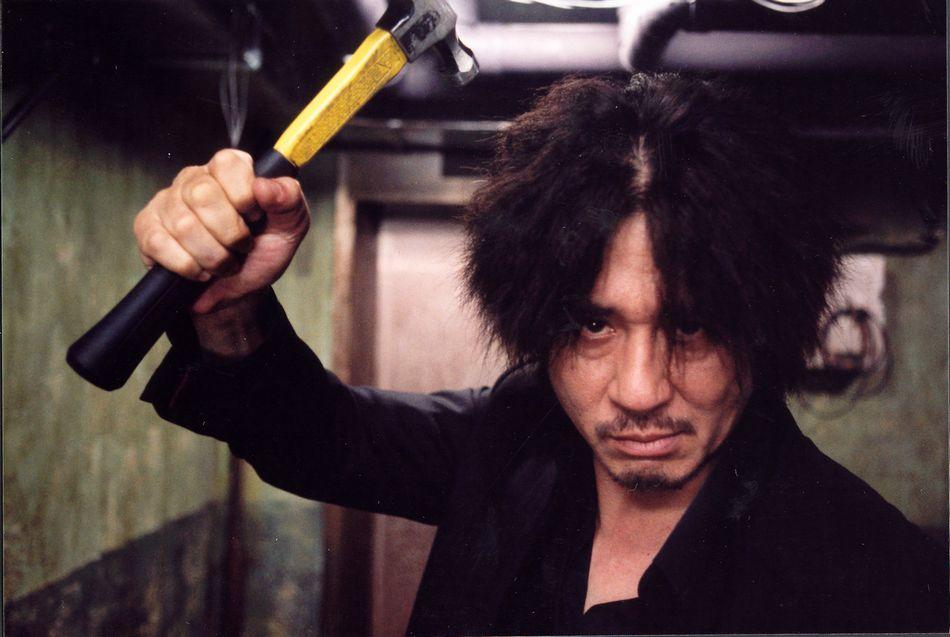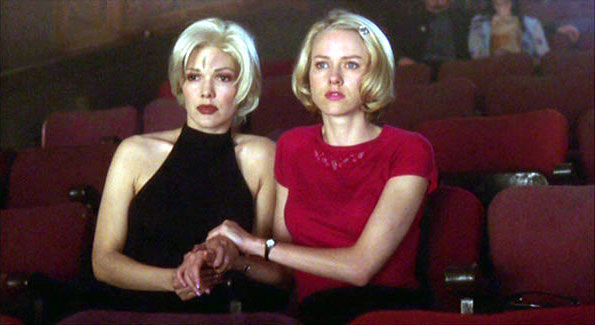5. Enemy (Denis Villeneuve)

In the last five years, Canadian director Denis Villeneuve raised the claim of being one of Hollywood’s future masters. With films like the sinister kidnapping-thriller “Prisoners”, the ruthlessly burning drug-syndicate movie “Sicario”, or philosophical sci-fi adventure “Arrival”, he’s made himself a highly reputable name in cinematic circles (his next movie, “Blade Runner 2049”, is one of the most anticipated movies of 2017 and has already offered stunning images with its first two trailers). With all of these huge productions in his oeuvre, one of his most interesting and original movies often goes by the board. “Enemy” from 2013, starring Jake Gyllenhaal, is one of the most hauntingly and psychologically penetrating movie of the last several years.
Based on the 2002 novel “The Double” by Portuguese author José Saramago, the movie tells the story of a frustrated teacher who’s trapped in his own unsatisfying life, circling around bitterness and cold-hearted sex with his partner. By accident, he discovers the existence of his doppelgänger. In order to unravel the mystery of his double, he tries to contact him. The movie unfolds a perplexing cobweb of psychological metaphors and interpersonal issues.
The movie’s aesthetic is strongly influenced by masterminds David Lynch and Stanley Kubrick and sprays a highly surrealistic vibe. The cinematography, with its illustration of brutal, concrete-dominated architecture and the diffuse air-polluted skyline of a dystopian metropolis, is excellently stunning.
The thriller is full of well-thought metaphors, symbolism and narrative hints, resulting in a highly complex story. Being well-constructed on every cinematic layer, the whole movie is a great example of intelligent non-linear storytelling. Even days after watching, one has to deal with the mind-penetrating nature of the movie, while trying to solve the nebulous narrative.
4. Caché (Michael Haneke)

With regards to its slow-paced narrative and reserved visuals, some would deny this movie’s status as a thriller, but in fact, “Caché”, by Austrian director Michael Haneke, is exactly that – thrilling. The film’s suspense is the product of precise character arcs and a matter-of-fact illustration of psychological stress and suppressed guilt inside a superficial well-working nuclear family.
The cinematic treatment of thriving evil inside the Western bourgeoisie isn’t new to cinema; in particular, Alfred Hitchcock and David Lynch advanced to the masters of this kind of storytelling. But while there are distinct parallels between theses three directors, Haneke has a trademark style that offers discrete characteristics.
An established Parisian TV moderator receives dubious observation videos of his own home. Initially dismissed as a harmless prank, the family is terrorized by the unknown sender, resulting in interpersonal distance and a changed structure of confidence. After trailing a clue, the family man is confronted with an Algerian friend of his parental home, resulting in the subconscious climbing of some deep sentiments.
The workmanship of the movie is impressive. The movie doesn’t feature any kind of music, but relies heavily on a very discreet but effective sound design. The movie’s ‘non-cinematic’ look scotches inaccessible tendencies of fiction and enhances the generated anxieties by visualizing a possible scenario and primal fears of human societies. A huge part of the movie is set in the family’s confining apartment, a space that is dominated by shades of black, white and beige, creating a maelstrom into the stories narrative abysses.
At first sight, the movie is a very personal story with the context of the family, but under this cloak there’s a far more relevant and world-involving theme. Haneke’s movie works as an unobtrusive comment on the relationship between the French and Algerian communities with its sad summit on “la nuit noire“ in 1961, when hundreds of Algerian protesters were killed by the police. At least since “Caché”, there’s no doubt on Haneke’s function as incarnated conscience of European cinema.
3. Oldboy (Park Chan-wook)

South Korean cinema has one of the most strong and distinct aesthetics in the world of movies. In particular, the 21st century offered some artistic highly valuable films, with 2003’s “Oldboy” likely sitting at the top of the list. Since its release, the movie has gained cult status and has worked as reference for a load of following movies, not just limited to South Korea.
The film could be described as a postmodern take on Greek tragedies such as Odysseus (the protagonist’s name Oh Dae-Su sounds quite familiar) or Oedipus, while functioning as a trailblazer of South Korean new wave. After being caged in a hotel room and spending 15 years in total isolation, an average-man starts an act of revenge against the murderer of his wife.
At its core, “Oldboy” is a movie about revenge (the director made several revenge movies with 2016’s “The Handmaiden” being another that would definitely deserve a spot on this list).
Simply said, the desire for vengeance is based on psychological compensation for injustice, making the movie an excellent example of a psychological thriller. With the film’s world being dominated by twisted secrets, incest, suicide and mutated violence, Park Chan-wook found a way to guide the audience through this labyrinth of perversions. “Oldboy” is a tour-de-force mélange of hallucinogenic surrealism, Kafkaesque melodrama, and modern fairytale.
2. Memento (Christopher Nolan)

After his well-received feature debut “Following” in 1998, “Memento” marks Christopher Nolan’s second movie and his breakthrough in Hollywood. Written with his brother Jonathan, the screenplay might be his most ambitious and experimental approach to date. The crux of the narrative’s structure is its reverse order. Starting with the ending, the movie tells its story with every successional scene being the previous one in the actual chain of events.
Furthermore, some scenes, screened in black and white, are shown in chronological order and work as the pre-story of the movie’s actual narrative. What sounds quite confusing is a masterpiece of non-conventional storytelling and it managed to tie the audience to the protagonist’s experiences for the full 109 minutes.
Suffering from his short-term memory loss, Leonard tries to solves his wife’s rape and subsequent murder. In order to remember his investigation progress, he’s reliant on his polaroid camera and tattoos on his body. During his search he is accompanied by the dubious policeman Teddy and the waitress Natalie.
Due to its reverse order, the audience has – as well as the protagonist – the distressing feel of losing their short-term memory. Furthermore, both supporting characters Teddy and Natalie gain a huge amount of unreliability, caused by the opacity of their aims.
Nolan’s whole oeuvre is crossed by his obsession for time and the cinematic possibilities of illustrating it. His treatment of time in “Memento” marks his first deep-reaching expedition in experimental realms in order to extract the narrative from a linear nature (his newest feature, “Dunkirk”, is another brilliant example of perfectly illustrating time and interweaving different timelines into one coherent narrative structure). Even after 17 years, “Memento” hasn’t lost any of its originality and inventiveness, and could rightly claim to be the Holy Grail of nonlinear cinema.
1. Mulholland Drive (David Lynch)

Watching a David Lynch movie could be described as entering someone else’s nightmare. When this is true, “Mulholland Drive” is Lynch’s quintessential film. The narrative is highly abstruse, while penetrating the deepest gorges of human psyche.
“Mulholland Drive” is a psychological thriller in the deepest sense. The reasons for that aren’t the movie’s psychological themes (some parts working as brilliant abstracted illustrations of the protagonist’s mind), but the movie’s ability to address the viewer’s psyche. From the highly immersive sound design to the intensity of some scenes, Lynch’s movie is aimed at the audience’s senses in order to touch places that are deeply hidden in the subconscious areas of the human mind. Analyzing particular scenes or the cinematic quality of “Mulholland Drive” would be highly redundant.
Often named as the greatest movie of the 21st century (the BBC ranked the movie in its 2016 poll in the first place), “Mulholland Drive” might be one of the most discussed films of all time. There’s not much to write, except to accentuate the movie’s status as the essence of psychological thrillers and one of the most intense experiences the cinema has to offer.
Author Bio: Berlin-based Luc Hinrichsen has a bachelor’s degree in audio engineering and plenty of experience in scoring movies on his own, while working for a film distribution company. Besides that, he’s an aspiring screenwriter and director always curious about enlarging his knowledge about film and its history.